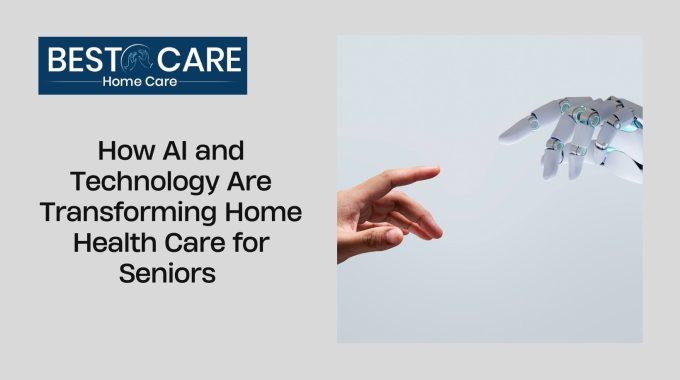Maintaining mobility and independence is essential to living a fulfilling life, especially as we age…

How AI and Technology Are Transforming Home Health Care for Seniors
In recent years, the integration of Artificial Intelligence (AI) and advanced technologies has revolutionized the landscape of home health care for seniors. These innovations are not only enhancing the quality of care but also empowering older adults to live independently and safely in the comfort of their homes.
Smart Monitoring for Enhanced Safety
AI-powered monitoring systems have become pivotal in ensuring the safety of seniors at home. Wearable devices and smart sensors can track vital signs, detect falls, and monitor daily activities. These technologies provide real-time alerts to caregivers and family members, enabling prompt responses to potential health issues. For instance, AI can analyze patterns in movement and behavior to predict and prevent falls, a common concern among the elderly.
Personalized Care Plans through Data Analytics
The use of AI allows for the creation of personalized care plans tailored to the specific needs of each senior. By analyzing data from various sources, including medical records and daily activity logs, AI can assist healthcare providers in developing individualized care strategies. This approach ensures that seniors receive the most appropriate and effective care, enhancing their overall well-being.
Virtual Companions to Combat Loneliness
Loneliness is a significant issue among older adults, often leading to depression and other health problems. AI-driven virtual companions, such as conversational robots and smart assistants, offer social interaction and emotional support. These devices can engage seniors in conversations, remind them of appointments, and even play games to stimulate cognitive function. By providing companionship, these technologies help alleviate feelings of isolation and improve mental health.
Remote Monitoring and Telehealth Integration
Telehealth services, supported by AI, enable healthcare providers to monitor seniors remotely. Through video consultations and remote diagnostics, medical professionals can assess and manage health conditions without the need for in-person visits. This is particularly beneficial for seniors with mobility issues or those living in rural areas where access to healthcare facilities may be limited.
Automating Daily Tasks for Greater Independence
AI technologies are also being utilized to assist seniors with daily tasks, promoting independence. Smart home devices can control lighting, temperature, and appliances, while voice-activated assistants can help with scheduling and reminders. These tools empower seniors to manage their environment and routines, reducing the need for constant assistance and enhancing their autonomy.
Addressing Caregiver Challenges
The integration of AI in home health care not only benefits seniors but also supports caregivers. By automating routine tasks and providing real-time data, AI reduces the workload of caregivers, allowing them to focus on more critical aspects of care. Additionally, AI can assist in training caregivers by providing them with up-to-date information and best practices.
Enhancing Medication Management
AI systems can aid in managing medications for seniors by sending reminders, tracking dosages, and alerting caregivers to potential interactions or missed doses. This ensures that seniors adhere to their prescribed medication regimens, reducing the risk of complications and hospitalizations.
Fall Detection and Emergency Response
Advanced AI algorithms can detect falls and other emergencies, triggering immediate alerts to caregivers or emergency services. This rapid response capability is crucial in preventing serious injuries and ensuring timely medical intervention when needed.
Cognitive Health Support
AI applications are being developed to support cognitive health in seniors. Programs that offer memory exercises, problem-solving tasks, and brain games can help maintain and even improve cognitive functions. These tools are particularly beneficial for seniors experiencing early signs of dementia or other cognitive impairments.
Ethical Considerations and Data Privacy
While AI offers numerous benefits, it also raises ethical concerns, particularly regarding data privacy and security. It’s essential for developers and healthcare providers to implement robust safeguards to protect sensitive information. Additionally, seniors should be educated about these technologies to ensure they are used responsibly and with informed consent.
Conclusion
The integration of AI and technology into home health care is transforming the way seniors live and receive care. These advancements are enhancing safety, promoting independence, and improving the overall quality of life for older adults. As technology continues to evolve, it holds the promise of even more innovative solutions to meet the needs of the aging population. Embracing these technologies can lead to a future where seniors can age gracefully and healthily in their own homes.




